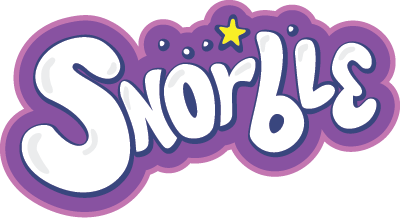Cackles, guffaws, chuckles, tee-hees, chortles - whatever you call it, laughter is the best medicine (besides actual medicine, of course, because you can’t treat cancer with jokes). For children, laughter is an important part of their development that helps them relax, relieve tension, and gives their mental health a positive boost.
“I’m not a comedian!,” you exclaim. Neither are we but, you don’t need to be Don Rickles - dated reference alert! - to make your kiddo laugh. With a little love and our smart companion Snorble® in your corner, you’ll have your little one laughing it up in no time.
The science behind giggles
When we experience pain, our body releases hormones called endorphins. These hormones are produced in the brain to reduce stress, relieve pain, and improve our overall mood. We can get endorphin boosts from many activities like exercise, eating, getting a massage, and laughing. When we laugh, our brain sends out a team of endorphins to let our body know that we don’t need to feel stressed at the moment. It’s like our brain is saying, “Go ahead and laugh it up. You’ve earned it!”
Besides endorphin production, laughter has the ability to soothe our entire body and relax our muscles up to 45 minutes post-giggle fit. Having a laugh can decrease stress hormones, increase immune cells and infection-fighting antibody production, and give us a feeling of calm. Because laughter relaxes the body, our mental health improves too. All those benefits just because we wanted to know why the chicken crossed the road!
A laughing child is a child who gets it
As parents, we all want our children to be happy, smart, creative, and well-adjusted. Being exposed to humor and laughter in the home can lead your kiddo to develop problem-solving skills, and increase their ability to make hard decisions using critical thinking. Tittering away, whether it’s from a book you’re reading to your little one, a joke you’ve told, or anything that makes them laugh can inspire creativity. Plus, when babies laugh, it’s the gosh-darned cutest thing in the world. In fact, when any child laughs it’s adorable no matter if they’re a toddler chuckling while playing with the family dog or an eight-year-old telling their first (of many) poop jokes. Get used to that. Kids are going to learn about body waste and they are going to laugh their heads off when talking about it. They’ll grow out of it. Unless they become proctologists.
Laughter + learning = success
We laugh, and we learn, but what happens when we combine them? We speed up our informational intake and can better remember facts. When reading to your kiddo or playing games, you can incorporate humor while teaching them. For instance, if you’re playing with blocks to help them with their motor and counting skills, you can use a silly voice or make up characters. Humor used in educational settings, whether at home or in the classroom, gives your child a better chance of retaining what they’re learning.
How to get your laughs at home
A great way to show your child the importance of laughter is to laugh at home. There are many ways to giggle that involve you and your kiddo yucking it up regularly.
- A list of laughs: if your youngster is feeling blue, create a laugh list with them. This will help them remember what they think is funny and you’ll have a ball doing it.
- Have a family laugh: whenever you can be together as a family, have a big laugh. This could be at Grandma’s house over the holidays, or in the car on the way to get groceries - basically any time you have your entire brood in one place. You can make a game of it by seeing who can laugh the longest or who takes the longest to break. Either way, you’re ramping up your kiddo’s endorphin production.
- Fake it until you make it: if you have nothing to laugh about, fake it. Even pretending to laugh can raise serotonin levels (the chemical that carries messages between our brain and body to help with sleep, digestion, nausea, blood clotting, and bone health).
- Put laughs on display: take a series of funny photos or videos with your youngster. Look at the photos and videos together when your kiddo needs a pick-me-up or you can print them out and hang them on the fridge, or frame them and hang them in your home.
- Laugh at yourself: if you make a little mistake in front of your child, laugh it off. This will show your kiddo that not everything deserves a tantrum. This isn’t to say that they won’t turn into a banshee at bedtime when you’re trying to put them down at night, but it does allow them to use humor as they get older to deal with whatever life throws at them.
- Get your appropriate guffaws in order: different cultures have different senses of humor which add to the cosmic gumbo that makes up our world. However, laughing at people who are different, teasing, or tee-heeing at anything inappropriate is never good. Teach your child about the difference between laughing at someone and laughing with them.
Snorble’s no joke when it comes to laughter
If your little one is feeling down or simply wants to chuckle, Snorble can tell them jokes. Because humor is such an important part of your child’s development, we felt that besides teaching your little one healthy habits, providing educational games, and social-emotional activities that help with development, we had to get some funnies in the mix. So, our smart companion’s got jokes. Age-appropriate jokes!
What jokes does Snorble tell? You’ll have to get one and see. But rest assured, none are proctology-related!
Sources:
- https://www.eskaykids.com.au/why-laughter-is-so-important-for-children/
- https://www.canr.msu.edu/news/children_and_laughter_a_winning_combination
- https://www.littlecedars.co.uk/benefits-of-laughter-for-babies-children/
- https://www.stlouischildrens.org/health-resources/pulse/set-stage-lifetime-laughter
- https://www.thegardnerschool.com/blog/the-power-of-laughter/
- https://www.nationalgeographic.co.uk/family/2021/01/lol-why-laughter-might-really-be-the-best-medicine-for-kids
- https://www.mayoclinic.org/healthy-lifestyle/stress-management/in-depth/stress-relief/art-20044456
Photo by Mieke Campbell on Unsplash


